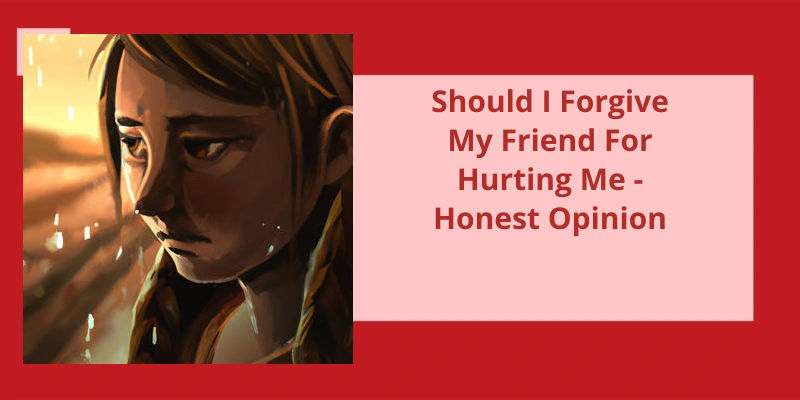Should I Forgive My Friend for Hurting Me – Honest Opinion | [Blog Name]. The question of whether to forgive a friend who’s hurt us is a complex and deeply personal one. Our emotions may be raw, our trust shattered, and forgiveness may seem like an impossible feat. However, it’s important to remember that forgiveness isn’t just about letting go of anger and resentment, but also about prioritizing our own mental health and well-being. Mental health experts often recommend forgiveness as a means to heal ourselves and move forward. But how do we navigate this journey of forgiveness when the pain inflicted by our friend feels so intense? When healing a friendship, it’s crucial to not only address the wounds caused by the other person but also to tend to our own healing process. This may involve introspection, self-reflection, and finding healthy coping mechanisms. Stephanie Beauchamp, a renowned mental health expert, suggests turning to tools such as meditation, breathwork, and journaling to help process the complex emotions that arise when dealing with forgiveness. These practices can provide a safe space for us to explore our feelings, gain clarity, and find inner peace. Journaling, for instance, allows us to put our thoughts and emotions onto paper, giving them structure and allowing us to examine them more objectively. Through journaling, we can gain a deeper understanding of our own emotions, wants, and needs. Similarly, meditation and breathwork enable us to tune into our inner selves and develop a sense of calmness and compassion. These practices teach us to observe our thoughts and feelings without judgment, fostering self-acceptance and understanding. Forgiveness, in it’s truest form, is a means of freeing ourselves from the burden of resentment and allowing ourselves to heal and move forward. By forgiving our friend, we release ourselves from the negative emotions that hold us back and create space for personal growth and emotional well-being. However, it’s essential to note that forgiveness doesn’t always mean the relationship can or should be restored to it’s former state. It’s okay to set boundaries and protect ourselves from further harm. Forgiving someone doesn’t mean we’ve to continue a friendship that’s toxic or unhealthy. It’s crucial to evaluate the dynamics of the friendship and consider whether it’s in our best interest to maintain or let go of the relationship. It’s a journey that requires self-reflection, understanding, and compassion. Whatever path we choose, it’s important to prioritize our own mental health and well-being. By engaging in practices like meditation, breathwork, and journaling, we can find the strength and clarity to navigate the complexities of forgiveness and heal ourselves in the process.
Is It OK to Not Forgive a Friend?
It’s a personal decision whether or not to forgive a friend who’s hurt you. It’s important to acknowledge that not wanting to forgive doesn’t make you a bad person. Forgiveness is a complex process that requires genuine feelings of healing and reconciliation, and it can’t be forced. Instead of pressuring yourself into forgiving when those emotions aren’t naturally arising, it may be more beneficial to explore alternative methods of coming to terms with the trauma.
One approach is to focus on self-care and prioritize your own well-being. This involves setting boundaries to protect yourself from further harm and engaging in activities that promote healing, such as therapy or journaling. By taking care of yourself, you can gain a better understanding of your emotions and the importance of your own needs.
Reflecting on the situation and the impact it had on you can also be helpful in the healing process. Acknowledging your feelings and the pain caused by the friends actions allows you to validate your experience and begin the journey towards self-compassion. It might be beneficial to talk to a trusted confidant or seek professional help to gain an outside perspective and work through your emotions.
Additionally, it’s important to reevaluate the friendship itself. Assess whether the relationship is healthy and worth investing in or if it may be better to distance yourself for your own well-being. Sometimes, forgiveness may not be necessary for closure or moving forward, and prioritizing your own happiness may require letting go of toxic connections.
Ultimately, forgiveness is a personal choice, and it’s okay to not forgive if the timing or circumstances don’t align with your emotional journey. It’s important to remember that healing takes time, and forcing forgiveness may hinder your own progress. Instead, focus on your own well-being, seek support, and explore alternative methods that can lead to personal growth and healing.
Forgiveness is a complex emotion, especially when it comes to someone who’s hurt you deeply. It may seem difficult to fathom forgiving them, but according to mental health experts, it can actually benefit your mental well-being to let go of grudges. However, forgiveness doesn’t require you to maintain a close relationship with the person who hurt you. In fact, it’s perfectly acceptable to forgive them and then choose to keep your distance for your own protection and well-being.
Can You Forgive Someone Who Hurt You Deeply?
Forgiveness is a complex and deeply personal process. When someone hurts us deeply, it can be challenging to consider forgiving them. However, it’s important to recognize that forgiveness isn’t about excusing or forgetting the harm done. Instead, it’s about finding peace within ourselves and moving forward.
It’s a powerful act of self-love and healing that can improve our mental health and well-being. However, it’s essential to prioritize our own needs and safety above all else. If forgiving the person doesn’t align with our best interest, it’s okay to choose a different path, one that allows us to heal and grow without their presence in our lives.
Source: Should You Forgive a Friend Who Has Hurt You Deeply?
It can be devastating when a close friend lies to you, but forgiveness is a crucial step for the healing process. Understanding the motive behind their lie and acknowledging your own feelings is essential. Recognizing that everyone lies at some point can help put things into perspective. Approaching the situation with care and open communication is key. Ultimately, forgiving and moving on is the final step towards repairing the friendship.
How Do You Forgive a Friend for Lying?
When faced with the question of whether or not to forgive a friend for lying, it’s important to approach the situation with an open mind and a willingness to understand their motivations. Step one in this process is to work out why they lied in the first place. Was it a simple misunderstanding, or did they’ve ulterior motives? Understanding their reasoning can help provide some clarity and make it easier to confront the situation.
Step two involves acknowledging your own feelings. It’s natural to feel hurt, betrayed, or even angry when a friend lies to you. It’s important to recognize and accept these emotions, as they’re a valid response to the situation. By allowing yourself to feel and process these emotions, you can begin to move towards a place of forgiveness.
Step three involves recognizing that everyone lies at some point in their lives. While lying isn’t ideal behavior, it’s a fact of human nature. Understanding this can help put your friends actions into perspective and prevent you from holding onto resentment or anger indefinitely.
Approaching the situation with care is step four. It’s important to have an open and honest conversation with your friend about the lie. Express your feelings calmly and assertively, without attacking or blaming them. By approaching the situation with care, you create an environment where both parties can communicate and work towards a resolution.
The Role of Forgiveness in Healing a Friendship
Forgiveness plays a crucial role in healing a friendship. When someone hurts us, it can create resentment and tension, causing the relationship to suffer. However, forgiving your friend can promote healing and restore trust.
By forgiving your friend, you’re choosing to let go of negative emotions and grudges. This act of forgiveness can lead to open and honest communication, allowing both parties to express their feelings and work towards resolving any underlying issues.
Forgiveness also allows for personal growth and a deeper understanding of one another. It allows you to move forward without holding on to resentment, creating the opportunity for a stronger and more resilient friendship.
While forgiveness is important, it’s equally essential to set boundaries and address the hurtful behavior. It’s crucial to have open conversations about what happened and how it made you feel. This allows you to rebuild trust and establish a healthier dynamic moving forward.
In conclusion, forgiveness is a powerful tool in healing a friendship. It allows for growth, understanding, and the chance to rebuild trust. However, it’s essential to address the hurt and establish boundaries to ensure a healthier and more fulfilling relationship.
Conclusion
While forgiveness doesn’t excuse or justify the actions of your friend, it can release you from the burden of resentment and anger. It’s important to remember that forgiving doesn’t mean forgetting or condoning the hurtful behavior, but rather choosing to let go of negative emotions and finding peace within yourself. Ultimately, only you can determine what’s best for you and your friendship – but considering the potential benefits of forgiveness can be a valuable step towards your own growth and well-being.





